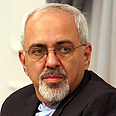
Iran: We want nuke deal soon as possible
Tehran keeps to conciliatory streak ahead of world powers meeting with Iran on Thursday. Iran's Rohani: Ready for serious talks, hope other side is too
Iran's new president said Wednesday his country is ready to negotiate and has "nothing to hide" as world powers prepare to revive stalled talks over Tehran's disputed nuclear activities.
Iran has agreed to meet with six world powers on Thursday on the sidelines of the United Nations General Assembly to try to restart nuclear negotiations that stalled in April. The West suspects Iran is trying to build a nuclear weapon, something Tehran has repeatedly denied.
Related stories:
- Iran press hails Obama's UN speech
- After Syria, US Congress wary of Obama's Iran thaw
- PM: Don't be fooled by Iran
"If there is political will on the other side, which we think there is, we are ready to talk," President Hasan Rohani told editors in New York in a meeting on the sidelines of the United Nations General Assembly. "We believe the nuclear issue will be solved by negotiation."
But Rohani said Iran must be careful in starting a new relationship with the US after three decades of frozen ties, adding that his first goal is to reduce the distrust. He noted that there are radical voices in America and radical voices in Iran who would not like to see that happen, but said that the voices of
moderation need to be strengthened and supported.
"The more two countries are apart, the more suspicions, fears and miscalculations creep in," Rohani said.
His remarks were made at a meeting of senior editors and news anchors, which initially was supposed to be off the record. However in response to requests from journalists, Rohani agreed some of his remarks could be quoted.
Earlier on Wednesday, Iran's foreign minister expressed the hope that a meeting with the five permanent UN Security Council members and Germany this week will kick-start negotiations to resolve the dispute over Tehran's nuclear program.
Asked what he expected from the meeting on Thursday with his counterparts from the United States, Britain, France, Russia, China and Germany, Iranian Foreign Minister Mohammad Javad Zarif said: "a jump-start to the negotiations ... with a view to reaching an agreement within the shortest span."
Speaking after a meeting with French Foreign Minister Laurent Fabius on the sidelines of the UN General Assembly, he said "the Islamic Republic has the political readiness and political will for serious negotiations and we are hopeful that the opposite side has this will as well."
Rohani in UN (Video: Reuters)
In addition to Zarif, US State Secretary John Kerry will also participate in Thursday's meeting P5+1
meeting, making history as the two countries FMs will sit together for the first time since relations were severed after the 1979 Islamic Revolution.
Over the last year several rounds of talks were held between Iran and world powers, but no significant progress was reached. According to UN reports, Iran continues to draw closer to a nuclear bomb.
Obama at UN (Video: Reuters)
But after the Russian-American agreement to disarm Syria's Assad from chemical weapons, a move which halted US plans for military action in Syria, the world now turns to a possible diplomatic solution on the Iranian front as well.
On the United Nations General Assembly, opened on Tuesday, US President Barack Obama expressed his readiness to examine the peaceful messages emanating from Tehran in recent weeks concerning its nuclear program.
Obama announced he will send Kerry to work with Iran and the world powers in an effort to reach a deal. However, Obama stressed that "US wants to resolve the Iranian nuclear issue peacefully but is determined to prevent Iran nuclear weapon."
Seven hours after Obama Iran's newly elected president, Hassan Rohani, took the podium and made an amicable address meant to broadcast to the West – sincerely or not – that Iran is ready for dialogue and for diplomatic compromise.
if the US "refrains from falling for war mongering pressure groups... and recognizes the principles of international law … then peace is in reach," Rohani said.
Rohani's speech was welcomed with applause – contrary to his predecessor, Mahmoud Ahmadinejad, whose speeches were received by representatives storming out of the hall. However, the Israeli delegation were absent during Rohani's speech.
After Obama's speech Israeli PM Netanyahu said the world "should not be fooled" by signs of moderation from Tehran, voicing deep skepticism about Iran's new outreach to the West in saying it is merely a ploy to ease international sanctions while secretly developing nuclear weapon.
"Iran thinks soothing words and token actions will enable it to continue on its path to the bomb.
"Like North Korea before it, Iran will continue to work to have sanctions removed in return for cosmetic concessions while it continues to preserve its ability to quickly build a nuclear bomb," Netanyahu said.
A senior US official, speaking on condition of anonymity, acknowledged Israeli doubts about Rohani's sincerity but insisted it was critical to put the new Iranian president's overtures to the test through diplomatic engagement
"They're sceptical of Iranian intentions - which is understandable, given their history with Iran - but we do see the potential for progress, certainly more so than we have in the last several years," the official said, adding that Washington was coordinating with Israel and US Gulf allies.
- Receive Ynetnews updates directly to your desktop











